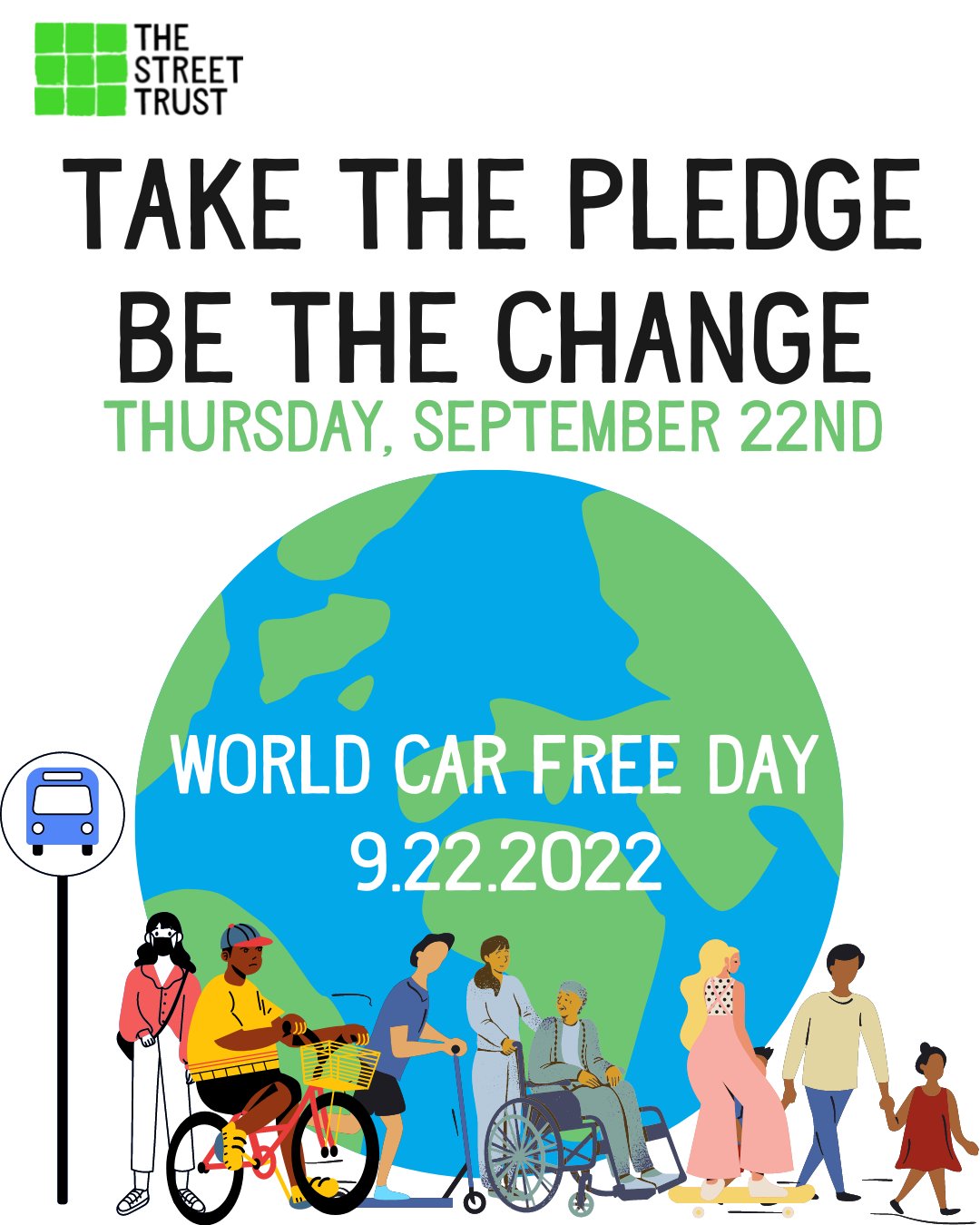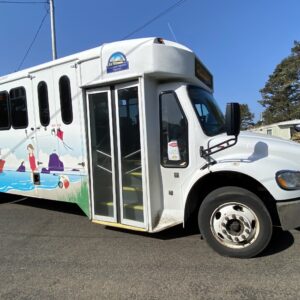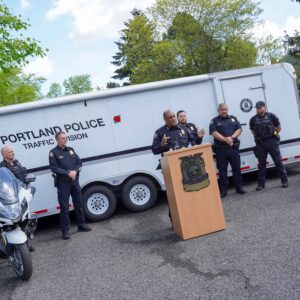
In a society where driving everywhere is the norm, people who don’t drive very often – or at all – are seen as strange or radical. But what’s truly radical is not even trying to do something else.
Disability Rights Washington (DRW) is promoting a statewide ‘Week Without Driving’ challenge starting Monday, and many of the state’s elected officials – including Governor Jay Inslee – have committed to participate. Inslee issued a proclamation to make the observance official.
“Going a week without driving is great way to understand how we can improve our current transportation system to better meet the needs of Washingtonians and improve and enhance transportation options such as transit, light rail, biking, and walking pathways as key strategies in our decarbonization efforts,” Inslee’s proclamation states.
It’s notable that a disability rights organization is leading this charge for carfree mobility in Washington. Disability advocates have been at the front of many transportation reform efforts, but it’s still a common misconception that encouraging noncar transportation options is ableist or that getting around without a car is exclusive to able-bodied people. This narrative neglects to consider the many disabled people who can’t drive and rely on alternative transportation to get around.
Noncar transportation can be accessible to all people if we make that a priority, and hopefully DRW’s carfree challenge will encourage people to apply that lens to their thinking about our transportation system.
I know from experience that challenging yourself to temporarily shake up your traveling habits can result in a permanent paradigm shift. Even a single day without driving could trigger the realization that it might actually be manageable to go a lot of places without ever stepping foot in a car – and it’s amazing to avoid sitting in traffic for hours or coughing up a small fortune on a regular basis to pay for gas.

Many people who now happily lead carfree lives (myself included) were once unthinking participants in car culture. While it would now take a concerted effort for me to have a day with driving, it wasn’t always this way! I could go on forever about how being carfree has substantially improved my life, but I’ll just urge you to try it out for yourselves, even if it’s only for a day.
It would be nice if our political leadership in Oregon would follow Washington’s lead and rally around a carfree challenge, too. But just because it’s not an official statewide event doesn’t mean Oregonians can’t participate in a no-driving challenge. Portland transportation advocacy non-profit The Street Trust is promoting International Car Free Day on September 22, inviting people to try a new form of transportation for a day, so if you want to align with a local group, you can take their pledge here.
I would love it if “carfree day” didn’t have to be commemorated at all because it was just the way most people lived their lives. But maybe challenges like this will be the first step in getting there.
Hope to see you out on your bike (or scooter, or the bus) next week!







Thanks for reading.
BikePortland has served this community with independent community journalism since 2005. We rely on subscriptions from readers like you to survive. Your financial support is vital in keeping this valuable resource alive and well.
Please subscribe today to strengthen and expand our work.
Yes! I accidentally fell into a (nearly) car-free lifestyle during work from home and now can’t imagine going back. The less time in the car, the better!
Back in the early 2000’s Portland had an annual car free day celebration. It only closed about one or two blocks to traffic each time, but it was prescient and attracted the attention and support of numerous HPV advocates.
I wonder why Portland can’t do this kind of thing now??
Great perspective, Taylor – I had a similar experience. I like to challenge myself to do things for 30 days. Right now it’s go to bed on time lol. Last September, I did the whole month car-free. It involved a pretty epic bike + bus +bike commute, some creative route planning, and some strife over flat tires, broken chains, and incomplete bike and transit networks.
When the month was over, I found that many of my habits really stuck though. I was already using the bike/bus/MAX for nights out, and found myself gravitating toward the bike + bus commute for the time I got to spend reading on the bus and the exercise I got riding the bike. I discovered how much I enjoyed walking to the grocery store a couple evenings a week when it’s slow, rather than loading up the back of the car every two weeks on a Saturday afternoon.
Now a year later, I’ve since gotten a new job that is about a 20 minute ride away on my ebike. I’ve reorganized some of my other travel habits around the more frequent bus lines and complete parts of the bike network. Unlike Taylor, I still haven’t gotten rid of my car – but it’s an old, reliable Honda that I switched to per-mile insurance because I drive maybe 10 miles a week on average now. What I’ve saved in insurance and gas has almost paid for the ebike already.
I suppose the point I’m trying to preach to the choir is that carfree transportation options have many intrinsic benefits past the environmental, physical, and mental health aspects. Building a better city isn’t about forcing people to take the bus or “control” like some folks like fantasize it is. It’s about giving people the option to not use the car. It’s important, I think, for advocates to highlight that you can still own and use a car, but only when it’s the right tool for the job. Case in point, I have friends who live in Boise, Idaho. If you’ve never been there, basically the whole city is suburban hell. The 6-lane stroads are clogged with auto traffic, and even thinking about riding a bike is enough to get slammed by a 3-ton lifted brodozer. Downtown is split by 4-6 lane arterials that people drive highway speeds on. My friends live about 1.5 miles from their childrens’ school. They would love to bike or walk there, but there is no safe route to do so. I think about them a lot when discussions of infrastructure come up. They don’t want to get rid of their cars or save the planet or anything, they just want to vibe with their kids on the way to school.
I’ll definitely be encouraging everyone I know to participate on the 22nd! I think a lot of people could really see a bit more of where us “radicals” are coming from.
I used to live in Boise. A delightful climate with a great riverside bike/ped path and easy access to a thriving downtown on relatively uncrowded roads which I bike commuted on. And conservative but relatively common sense politics. Great brewpubs too!
But that was then. The influx of white supremacists and religious hystericals have ruined it forever. Now it’s become just a small sampling of America’s overall disintegration.
Once upon a time (couple years ago) I would walk to my local grocery store for my food. No more. Too many hazards from the campers blocking sidewalks, bike lanes, and parking lanes.
TriMet isn’t an option either as I take MAX and there’s no way I would carry a couple bags of groceries/goods on the train with the numerous encounters I’ve had with others.
It’s a laudable goal, for sure, but until this City takes their obligation to making the streets/transit safe for all then they’ll never get to a dream of a city without or at least fewer car trips.Heck they’ve been trying to get people out of their cars from the early 70s and have little success in all this time.
Waiting for the winds of change to blow your clouds away isn’t a good long term strategy. The best path is through the obstacles life present. Do yourself and our community a favor and walk like our lives depend on it. While you may temporarily feel better driving around these problems it will only get worse in the future.
I hate these hollow commitments from politicians like Inslee. It’s very easy for him to say he won’t drive for a week when he has staff who will drive him everywhere.
When I see leaders cycling to the store for groceries, then I’ll know their commitments mean something.
Take a look at stories from last years Week Without Driving in Washington Fred.
You’ll be pleasantly surprised at the elected and civic leaders who spent their weeks trying, and sometimes failing, to get around to daily meetings, school pickups, grocery shopping, and events without a car (without staff driving them too!).
By participating in a Week Without Driving, decision-makers learned how deficient our streets, transit, bike lanes, and road safety systems are, and spent the following year more focused on improving transportation because of their week of struggles.
Also by participating many people made permanent changes in going places without a car. It’s was good exercise for sure and one I hope Oregon supports some day!
Lead by example
Unfortunately an awful lot of Portlanders ditched their bikes instead of their “cars”*:
There was a 46% drop in cycling in 2021 (vs 2019) according to census ACS data:
https://data.census.gov/cedsci/table?t=Commuting&g=1600000US4159000&tid=ACSST1Y2021.S0801
Driving an SUV/personal truck/car fell by only 17%, which is really depressing.
Although market urbanists have a tendency to celebrate “working from home as” some great Jacobsian victory, VMT data shows that those who switched to working from home in Oregon drove about as much as they did previously:
This should surprise no one as the literature shows time and time again that working from home has, at best, only a small effect on VMT.
*SUVs/personal-trucks
While I think these challenges are great and a step in the right direction, it seems the big picture way towards culture shift is through better and consistent messaging. Things that sound good to most of us often sound adversarial/confrontational to those immersed in car culture. Take the “one less car” sticker applied to so many bicycles, including mine. To me, I see that as: one less threatening machine careening down the street, one less tailpipe stinking up the place, one less bit of noise disrupting the calm, etc. All the good things right? The perspective of “one less car” from an unwavering car driver is [and I’m guessing here] perceived as an attack on their choices, a guilt trip for going about their day, for working, for picking up the kids, etc. This is one small example of the general themes that resonate very differently in different tribes. And this energy continues the divisive us vs them mentality of bikes vs cars. Meanwhile, a logical thinking person who can understand the forest from the trees, who can grasp concepts like induced demand should always be advocating for a multi-modal transportation portfolio. A person who reliably needs to drive, like a construction company, would benefit from bike lanes, transit and working-from-home initiatives to lower demand for the motoring part of the roadway. Their traffic and parking situation would improve with the lowest government spending.
My rambling point is that language surrounding transportation choices should feel inclusive and supportive to all needs versus perpetuating divisiveness.